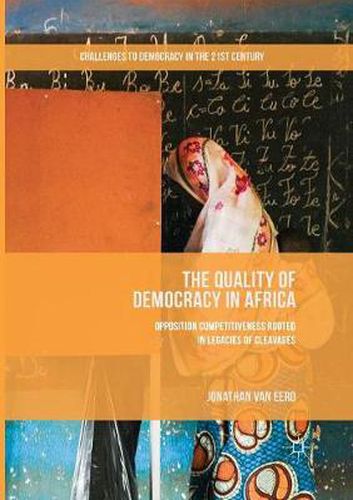Readings Newsletter
Become a Readings Member to make your shopping experience even easier.
Sign in or sign up for free!
You’re not far away from qualifying for FREE standard shipping within Australia
You’ve qualified for FREE standard shipping within Australia
The cart is loading…






This title is printed to order. This book may have been self-published. If so, we cannot guarantee the quality of the content. In the main most books will have gone through the editing process however some may not. We therefore suggest that you be aware of this before ordering this book. If in doubt check either the author or publisher’s details as we are unable to accept any returns unless they are faulty. Please contact us if you have any questions.
This book shows that democratization in sub-Saharan Africa can be successful, even if the government remains dominated by one major political party. If an institutionalized and strong opposition party - even when too weak to take power - challenges the dominant government party, the quality of democracy improves substantially. The comparative study demonstrates that competitive opposition parties in dominant party systems are rooted in the historical legacy of political cleavages related to de-colonization that precede the third wave of democratization of the 1990s and have survived the instability of post-independence political developments to the present day. The study covers 19 African countries and 55 elections overall, including four in-depth case studies of Botswana, Lesotho, Ghana and Mali. It offers scholars and practitioners of electoral democracies and competitive authoritarian regimes a novel view on the role of party systems in processes of democratization. It makes an important contribution to the general literature on state building intertwined with democratization and representation in old and new democracies.
$9.00 standard shipping within Australia
FREE standard shipping within Australia for orders over $100.00
Express & International shipping calculated at checkout
This title is printed to order. This book may have been self-published. If so, we cannot guarantee the quality of the content. In the main most books will have gone through the editing process however some may not. We therefore suggest that you be aware of this before ordering this book. If in doubt check either the author or publisher’s details as we are unable to accept any returns unless they are faulty. Please contact us if you have any questions.
This book shows that democratization in sub-Saharan Africa can be successful, even if the government remains dominated by one major political party. If an institutionalized and strong opposition party - even when too weak to take power - challenges the dominant government party, the quality of democracy improves substantially. The comparative study demonstrates that competitive opposition parties in dominant party systems are rooted in the historical legacy of political cleavages related to de-colonization that precede the third wave of democratization of the 1990s and have survived the instability of post-independence political developments to the present day. The study covers 19 African countries and 55 elections overall, including four in-depth case studies of Botswana, Lesotho, Ghana and Mali. It offers scholars and practitioners of electoral democracies and competitive authoritarian regimes a novel view on the role of party systems in processes of democratization. It makes an important contribution to the general literature on state building intertwined with democratization and representation in old and new democracies.